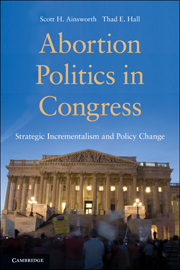Book contents
- Frontmatter
- Contents
- Tables
- Figures
- Acknowledgments
- Part I Strategic Incrementalism and the Political Backdrop for Abortion Politics in Congress
- Part II Abortion in the House
- 5 Sponsors of Abortion Policies
- 6 Playing the Field: Committee Referrals of Abortion-Related Proposals
- 7 Conclusion
- References
- Index
5 - Sponsors of Abortion Policies
Published online by Cambridge University Press: 05 June 2012
- Frontmatter
- Contents
- Tables
- Figures
- Acknowledgments
- Part I Strategic Incrementalism and the Political Backdrop for Abortion Politics in Congress
- Part II Abortion in the House
- 5 Sponsors of Abortion Policies
- 6 Playing the Field: Committee Referrals of Abortion-Related Proposals
- 7 Conclusion
- References
- Index
Summary
Bill sponsorship “is a strong indicator of which issues he or she wants to be associated with and the reputation he or she wants to acquire among colleagues.” (Schiller 1995, 187)
Introduction
If your average, politically astute person was asked the question, “Who has been the most prolific sponsor of constitutional amendments that would ban abortions?,” she might name Chris Smith, the Republican representative from New Jersey or the late Henry Hyde, a former Republican member from Illinois. If she could not guess the member of Congress by name, she would almost certainly guess that the person was a Republican and a conservative. Alas, the guess would be completely wrong.
The most prolific sponsor of constitutional amendments to ban abortion has been Representative James Oberstar, a Democrat from Minnesota and a stalwart liberal. Oberstar was one of the first sponsors – going all of the way back to the 94th Congress – of abortion legislation that would institute a constitutional ban on abortions. Oberstar has introduced the same constitutional amendment on abortion every Congress for the past thirty years. Although his amendments have never gone beyond being referred to the House Committee on the Judiciary, this legislation and Oberstar’s persistence is deeply symbolic. Looking at Representative Oberstar’s biography, it is easy to see possible roots of such efforts: Oberstar is a devout Catholic. Elizabeth Oldmixon (2005) finds that religion is an important factor in legislators’ attitudes and decision making surrounding a wide array of morality issues, such as abortion. Barry Burden (2007) argues that the personal experiences and the individual characteristics of legislators have direct effects on legislative decision making, even after controlling for the usual suspects in social science analyses of legislative votes.
- Type
- Chapter
- Information
- Abortion Politics in CongressStrategic Incrementalism and Policy Change, pp. 125 - 148Publisher: Cambridge University PressPrint publication year: 2010



